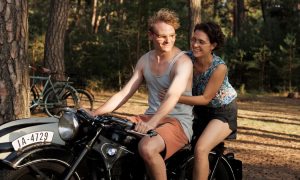 Presented by State Theatre of SA
Presented by State Theatre of SA
Reviewed Tuesday 9th August 2011
http://statetheatrecompany.com.au/season-2011/three-sisters?layout=item
Venue: Dunstan Playhouse, Adelaide Festival Centre, King William Road, Adelaide
Season: to Sun 28th Aug, various days and times, see the BASS web site for details
Duration: 3hrs 15min incl interval
Tickets: adult $49/conc $42/under 30s $29
Bookings: BASS 131 241 or http://www.bass.net.au
State Theatre are tackling Anton Chekov's tragi-comedy about three city bred girls, the Prozorof sisters, who find themselves trapped in a small provincial town. This is a powerful play that still has relevance today. As the play begins they have been there for eleven years, having moved there from Moscow. It is the fifth of May, the name day of the youngest sister, Irina, who is now twenty. It is also the first anniversary of the death of their father. Masha is 25 and has been married for seven years to Kulygin, an older man who is a teacher and who had impressed her when she was 18, but now bores her. Olga is 28, a spinster and a teacher at the local high school, who fills in for the often absent headmistress. Their brother, Andrey, has a bright future planned, with intentions of becoming a university professor in Moscow. He is in love with Natasha, however, whom the sisters see as socially below them, lacking in taste and as a person to ridicule.
An artillery battery is stationed nearby and the officers and men stationed there are frequent visitors to the family home. Irina is the centre of attention for a number of the soldiers, a source of considerable conflict that will eventually add to the tragedy of this play. There is also an attraction between Masha and the married Lieutenant Colonel Vershinin.
It is only the distractions provided by the soldiers, their hopes for Andrey's future and their dreams of returning to Moscow that keep up the spirits of the sisters. They all think that returning to Moscow will change everything for the better. If one substitutes 'winning X-Lotto' for 'going to Moscow' you have a modern equivalent of that belief in relying on one important thing changing to instantly make everything right. As the play unfolds those hopes and dreams are all shattered.
Third year acting student at AC Arts, Kate Cheel, plays Irina, investing her character with a youthful liveliness and innocence, such that she is still fascinated by a spinning top, progressively changing as the play covers a lengthy period of time. Act II takes place 21 months later, Act III another year later again, set against the background of a fire in the town destroying buildings and leaving many homeless, then Act IV finds the artillery battery packing up to leave. By this time, Irina has resigned herself to marrying Baron Tuzenbach, who has since resigned from his position with the military. She is now working unhappily at the telegraph office. By the end of the play, Cheel has taken her character through several stages to a greater level of maturity, commensurate with the passing years, and she shows that Irina has given up her hopes and is prepared to settle for life as a spinster teacher, following in Olga's footsteps. Cheel is already impressing people with this first professional performance and will be one to watch closely in the near future.
Ksenja Logos plays Masha and offers us a portrayal of a woman in a loveless marriage who sees an unchanging future ahead of her. She conveys, beautifully, the emptiness of Masha's life and her bitterness at her fate, then expresses the changes in Masha as she comes alive again through her affair with Vershinin, only to be crushed when the soldiers leave. Logos shows all of the changes in Masha with moving clarity and a convincing emotional journey.
In an unusual casting decision, Adam Cook has chosen Carmel Johnson to play Olga, a choice that confused at least one member of the audience near me who was overhead to say “I thought their mother was dead?” In spite of the age difference between Johnson and Olga, she manages to make it work due to her great skill. Once one has become accustomed to this age disparity her portrayal of the oldest sister takes on a fully three dimensional and rewarding characterisation.
Andrey is played by Patrick Graham in a fine display of a man on a downward path that he seems unable to escape. His failed marriage to Natasha, his massive gambling debts, his shame at mortgaging the house without telling his sisters and becoming little more than a babysitter for their two children all take their toll. Added to this is the dashing of all of his aspirations and his acceptance of a minor post with the town council. Graham gives a superb performance, with a carefully constructed progressive change from the beginning, with a carefree young man in the throes of love and the world in front of him, and ending with a man downtrodden, with nothing left and nothing to look forward to. You can see the light go out in his eyes step by step as Graham traverses Andrey's deteriorating life.
Nadia Rossi plays the unpleasant Natasha, making her larger than life character more self-centred than Patsy and Edwina combined. By the end of the play she has emasculated Andrey, cuckolded him with his superior officer on the town council and taken over full control of the home, driving the sisters away. She is one of only two people who are happy at the close of the play, having got her own way in everything. Rossi makes it clear that the only people who have any interest for Natasha, apart from herself, are her two children.
The only other person happy with their lot by the play's close is the 82 year old family nurse, Anfisa, past her working years and facing eviction by Natasha, but taken away by Olga when she is promoted to headmistress and moves to the school. Bridget Walters plays Anfisa, switching easily between the gentle humour of the rather doddery old dear and the tears and terror of a woman facing an uncertain future. The display of relief and gratitude that Walters shows, when Anfisa finds she has a home for life with Olga, is marvellous.
Peter O'Brien gives a strong performance as the sophisticated and charismatic, Vershinin, long married and now tired of his wife, who makes unsuccessful attempts at suicide too often to be any longer taken seriously. He gives a rich and complex characterisation and his demeanour, confidence and smart appearance show us every reason to see why Masha falls for him.
Geoff Revell is Kulygin, Masha's boring husband, stiff, starchy, self-absorbed, self-delusional, self-important and deathly dull, constantly using Latin and attempting to display his knowledge. At 18, this was what attracted Masha to him but, now that she is older, she realises that this was all a cover for his lack of any real personality. This is a role that gives Revell ample scope to create a rather eccentric character, a figure of fun who hides his pain and forgives Masha for her affair because he cannot live without her, even though he knows she no lo\nger loves him. Revell clearly relishes the role..
Nathan O'Keefe plays the socially inept Solyony, also in love with Irina, but of no interest to her. O'Keefe, once again, surprises with his ability to continually create completely different characters every time he appears in a production. Today we would probably refer to Solyony as a stalker and O'Keefe brings that dangerous edge to the role.
Renato Mussolino is the Baron Tuzenbach, in love with Irina, but unloved. He is a good and kind man and Irina finally accepts his proposal. He knows that she does not love him but accepts that. Mussolino brings out that gentility and understanding but also shows that Tuzenbach is sad that he is unloved and really wants more, placing an ambiguity on his encounter with Solyony near the end of the play.
Michael Habib is the 60 year old alcoholic doctor with the artillery battery, Chebutykin, and does a sterling job, barely recognisable in his characterisation. He gives us the subtle hints, without labouring them, that he might possibly have had an affair with the mother of Irina and, in fact, could even be Irina's father.
Roman Vaculik is Fedotik, another admirer of Irina who brings her gifts and takes photographs of her, and Chris Asimos is Rode, another of the soldiers regularly visiting the house and who is also a coach at the high school. Even these minor roles have been well cast and we see believable portrayals from these two.
Edwin Hodgeman takes the role of Ferapont, the doorkeeper at the local council offices. He is rather deaf and obsessed with trivial and unsubstantiated facts, mainly about Moscow. Hodgeman makes good use of his opportunities for comedy in his few brief appearances, as Ferapont carrys documents to be read or signed.
The set, co-designed by Adam Cook and Gavan Swift is the weak link and just does not work. It is presented as an archaeological dig, with the home of the Prozorof family discovered below the floor of a typical modern concrete monstrosity. From an archaeological perspective, an architectural viewpoint, and a structural engineering perspective everything is wrong and impossible. What red, central Australian dust is doing in the ruins of a provincial Russian home is anybody's guess.
From an audience perspective there were more problems especially if, as I was, you were in one of the worst seats in the house, in the very front row, with the feet of the actors at eye level. Whenever actors came downstage their heads were not seen against the few metres of lower scenery, the family home, but against the oppressive bulk of the new building above, bringing them into the present.
The heavy room above and the fixed walls of the lower level, permanently linked by a ladder, also made it hard to accept the location changes from the opening acts, to the bedroom of Olga and Irina in the third, and out in the garden for the fourth. It also held us in us in a fixed time, controlled by the unchanging dig, rather than indicating several dates over a period of almost four years. It also allowed Swift little scope for anything particularly interesting in his lighting design.
The sides of this box set also go back too sharply, so that anybody sitting at the extreme sides of the auditorium, more very bad seats, are unable to see the wall on the side on which they are sitting. Somebody sitting in such a seat was not only unable to see an actor hide in a wardrobe, but didn't even know there was a wardrobe.
Composer, Jason Sweeney's, sound design is far more well-considered, complementing and highlighting the action, and Ailsa Paterson's costuming, apart from the 'archaeologists' looking more like council workers, looks great and sets the period well. Go for the great performances and try to ignore the set.
Reviewed by Barry Lenny, Arts Editor, Glam Adelaide.



















